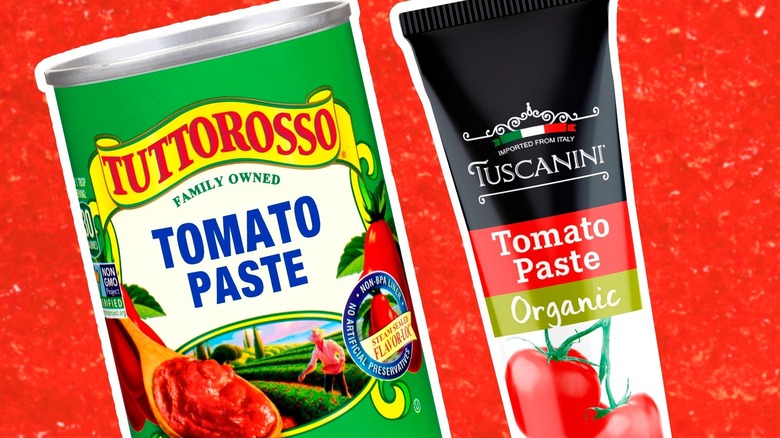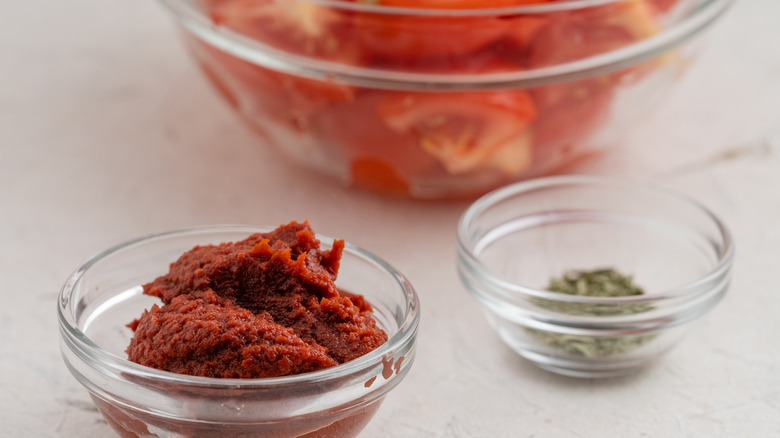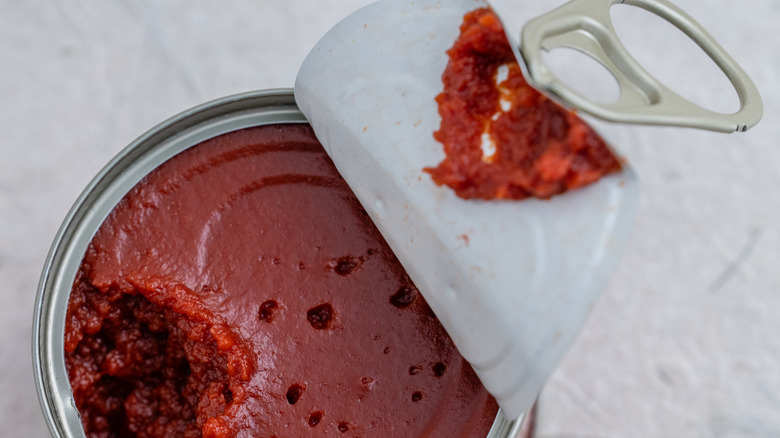Canned Vs Tubed Tomato Paste: Does It Make A Difference?
Tomatoes are a wondrous fruit. Their bright color is eye-catching when sliced raw, and retains vibrancy even when processed. It's an ingredient that readily transforms into many delicious foodstuffs like beloved ketchup, aromatic sun-dried tomatoes, handy tomato puree, and the often underrated paste.
This ultra-flavorful condiment is made by simmering tomatoes for a prolonged duration, removing skin and seeds in the process. During heating, the flavor concentrates, attaining savory notes in one bite. It's an easy-to-integrate product that enhances a large assortment of dishes — not just pasta sauce.
Whenever you're shopping for tomato paste, you might notice it's available in both canned and tube form. More or less, it's different packaging for the same substance, and either choice won't make or break a dish. However, the two do pack in a few distinctions that are worth noting. Canned tomato paste is processed differently, using citric acid rather than salt. It has a slightly less robust flavor and thicker consistency. Tubed tomato paste, on the other hand, is nearly always sourced from Italy, lending it a bit more uniformity in contrast to the can's wide-reaching nature.
The tomato pastes are processed differently
In part, the tomato paste's difference in processing arises due to regional habits. Canning is a common preservation technique in the U.S., as witnessed by the many must-have canned foods for your pantry. This style of tomato paste integrates citric acid, which creates stability, and comes with extra tartness. In conjunction with the tomatoes, this can inspire some off-tasting metallic notes when mingling with the can. However, note that there's discrepancy among brands, with some offering sweeter or thicker versions, as well as minimizing this flavor.
Additionally, there are distinctions in how the tomatoes are prepared prior to storage. American producers heat their fruit mixture to around 50 degrees hotter, which impacts enzymes and breaks down the tomatoes into a thicker, more caramelized paste. Meanwhile, the Italian process — which seasons only with salt — employs a cooler cooking process, creating a more liquidy paste with a lighter flavor and color.
The contained vessels impact the storage and longevity, too. You'll need to transfer the remnant paste from a can into an airtight container and place it in the freezer, since it'll spoil quicker in the fridge with all of the air contact. Conversely, the tubed format can be kept in the fridge and used in small portions for a longer duration. However, this preservation style does cost around twice as much, which is worth considering with frequent use.
Different tomato paste varieties suit various applications
If you're buying tomato paste in tube form, it's almost certainly coming from Italy, which also means it's going to maintain a particular palate. It's a fresh and bright mix ideal for enhancing an all-purpose tomato sauce with a dash of Mediterranean flavor. Other than the option to buy double-concentrated paste for added umami flavor, Italian tomato pastes are relatively uniform.
However, when shopping for tomato paste in canned form, you'll need to keep an eye on the extensive selection. Some producers incorporate spices, like basil or oregano, into their tomato paste mix, setting you up for dishes like herb and vegetable tomato soup, but interfering with other recipes. Additionally, organic shoppers will have a few more options when buying canned tomato paste. Just make sure not to mistake the paste with products like puree or diced tomatoes.
A can also enables branching out to other paste styles, too. Although more often jarred, you might find Turkish-style tomato paste in a can. Called salça, it's a fundamental culinary ingredient in the Eurasian nation, used as a foundation for sauces, sautes, and many other dishes. As opposed to American and Italian tomato pastes, it has an extra-rich, savory flavor, due to its composition of fruit that's sun-dried at the end of the season. So, if you find a can online, it's worth the purchase — as is tomato paste in any other format, too.


